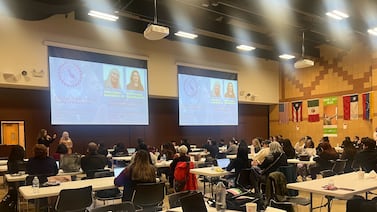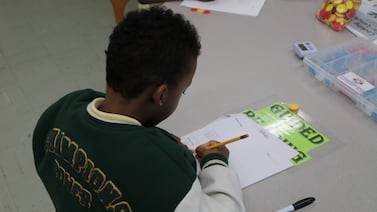Trash continues to pile up at schools around Philadelphia, including Houston school in Mount Airy, where two dumpsters overflowed in the corner of a yard next to the 100-year-old building. Students in Mitchell Elementary in Kingsessing did not get school meals on Thursday because there were no food service workers to prepare and serve it.
The bus driver shortage has not abated, and some children are still not getting to school on time, or not getting home for hours. And most schools lack the personnel and, in some cases, supplies to follow the latest recommendation of the Philadelphia Department of Public Health to regularly test unvaccinated students for COVID.
The start of the school year in the Philadelphia school district has been chaotic and problem filled, with a labor shortage driving many of the unresolved issues. Three weeks into the year, many parents, teachers and principals are frustrated, stressed and angry.
“There are so many things wrong with the start of this school year that I hardly know where to begin,” parent Stephanie King told the Board of Education Thursday night.
Robin Cooper, president of the Commonwealth Association of School Administrators, which represents principals, said the school year has been difficult “on all sides.”
“I’ve gotten a number of calls, I have people in their offices crying. I have administrators not getting home until 7 or 8 p.m. because of the busing situation. They’re stuck, and they can’t pick up their own children,” she said. “My folks are falling apart.”
District officials still are trying to fill a number of jobs, from 218 openings for teachers and counselors, to 748 vacancies for a variety of other roles, including teacher assistants, bus drivers and attendants, custodians, food service workers, nurses and special education aides.
A district contractor, J.P. Mascaro & Sons, said trash has piled up in schoolyards because of a shortage of drivers.
“We are trying diligently to fill as many vacancies as possible,” said Monica Lewis, a district spokesperson. “There are shortages in every facet of the organization. Districts across the country are facing the same challenges. It’s a matter of finding qualified people to take the roles when offered.”
At Mitchell Elementary, where students didn’t get school meals Thursday because of staff shortages, the principal ordered pizza. Lewis said there was food on site, but the principal thought ordering the pizza was the “easiest thing to do.” Staff disputes that meals had been delivered.
The issue was resolved by Friday, Lewis said.
Some advocates say they could have helped if the district had been more transparent about its problems and needs.
“The district started the year with 1,000 vacancies,” said Shakeda Gaines, president of the citywide Home and School Association. “If they had told us, we would have come in with more expectations to help instead of pointing fingers. We have parents who are willing to volunteer who are not allowed in their buildings.”
But Lewis defended the district’s efforts to reach out. “I think we have been transparent,” she said. “We’ve been clear about the bus driver shortage and food service, and things of that nature. We’ve been recruiting for months now.”
Teachers, nurses and students also have expressed concerns about COVID safety protocols, from testing to social distancing. The Philadelphia Federation of Teachers fiercely objected to the district’s decision this year to test only symptomatic students — and those who participate in certain sports and arts activities, such as choir and band.
Nurses, who have been doing the testing, have reported being overwhelmed and overworked. In a survey sent by the PFT, which was filled out by 4,200 members, 28% of nurses said they lacked COVID testing supplies, 27% said they didn’t have a room in which to isolate symptomatic students, and more than half said they were conducting contract tracing without the assistance of health officials.
One nurse in the survey said: “It is not realistic and/or possible for one person on any given day to do what is being asked.”
The health department now recommends more regular testing of all students “where possible” but said it doesn’t plan to enforce the new guideline.
“This is a recommendation that we know is difficult to implement because of how difficult it is to secure testing supplies right now,” James Garrow, a department spokesperson, said via email. “It’s our hope that as testing supplies and testing capacity are more available, that schools will start to implement this.”
At the board meeting Thursday, the two student representatives on the board said that even the old guidelines for testing students were not being followed.
Student representative Rebecca Allen, a junior at Central High School, said students in fine arts and sports at her school have not been tested. “We have not been tested at all,” she said.
Superintendent William Hite said the district will have to depend on outside resources to help with testing since nurses are overwhelmed. At Thursday’s meeting, the board passed a resolution to partner with Children’s Hospital of Philadelphia for more testing supplies and “to advise on testing plan and design as necessary.”
Allen and the other student representative on the board, Armando Ortez, said there were other issues in schools around COVID safety as well.
“There are so many congested areas that there’s no way you can work around them pretty much because there’s so many students and so much traffic. Students are not feeling safe, we are like sardines in the hallway,” Allen told Hite.
Ortez, a senior at Northeast High, termed the return to in-person school “bittersweet.”
“Over the last few weeks Rebecca and I have enjoyed seeing our peers, but there’s concern over COVID-19 health and safety measures. Overall many of the concerns that Rebecca and I are hearing from our peers and teachers are around information and ensuring that procedures and protocols set by the district are not only available to our parents and teachers but also for students as well.”
In the PFT survey, 20% of respondents reported problems with mask compliance in their school, 35% said there was a lack of hand sanitizer, and 10% said air purifiers in their rooms were not operational.
The principals union still doesn’t have a contract. But despite everything, Cooper says she hasn’t lost hope.
“I’m optimistic things will get better,” she said.
Johann Calhoun contributed to this report






